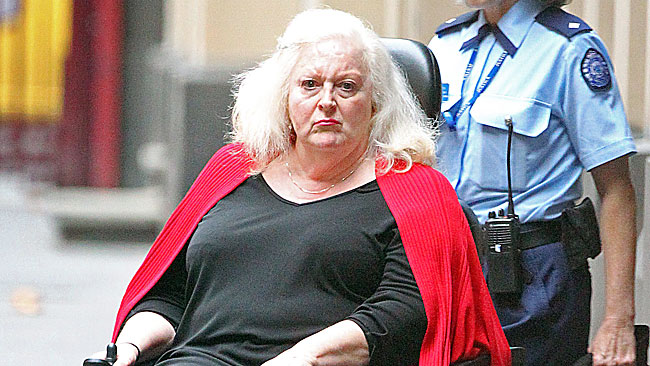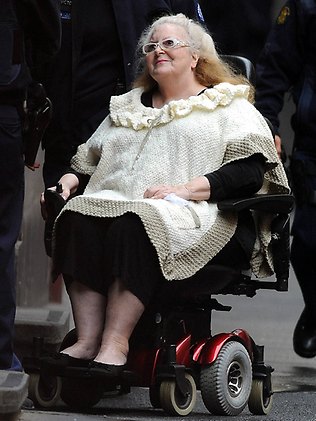Judy Moran departs from public life looking sore, but not sorry
IN the Supreme Court dock, gangland matriarch Judy Moran is making a show out of her suffering, milking her last public act.
null
Don't miss out on the headlines from null. Followed categories will be added to My News.
IN the Supreme Court dock, gangland matriarch Judy Moran is making a show out of her suffering, milking her last public act.
She screws her eyes up, winces with each movement and mouths a silent "Ow!'' or "Ouch!'' each time her arthritic hips grate as she shifts on her chair.
Justice Lex Lasry is about to slam the door on a sordid life defined by gunshots and graves, populated by the ghosts of all those she purported to love.
He is primed to shut Moran away, most likely for what is left of her life, but she reacts only to her own discomfort and not to his condemnation.
She looks sore, annoyed, inconvenienced, resentful and not in the least sorry.
Judge Lasry says he doesn't know if money or malice drove Moran to trade a new car for her brother-in-law Tuppence's death, but is certain about her state of mind now.
"There is, of course, no sign of remorse on your part for the killing of Desmond Moran,'' he says, talking to himself for all the reaction his words draw from Moran.
She stares ahead, unbowed, unshaken, mouth turned down, sour at her own lot.
At one time Moran was a dancer, good enough to get on TV.
The theatrical bent showed during a succession of family funerals and gangland trials, where she played the mourning mother, wronged widow and flashy angel of vengeance.
In flamboyant hats and chunky jewellery, she looked ready for the racetrack but spoke back-alley tough.
For sentencing, though, she has rolled feebly into court on a red motorised scooter and mouthed a silent "Hello'' to supporters in the back row.
Looking every bit her age, 66, she is wearing a nanna-issue crochetted white poncho and her mass of wiry grey hair bleached blonde is pulled up and swept back roughly.
There is none of the jewellery, bright red spectacles, big sunglasses or the wide-brimmed hats, none of the past flashiness but still enough of the cockiness.
Moran looks indignant but not in the least sorry.
Earlier, Geoffrey Armour, who pulled the trigger seven times at her behest, has copped his 21 years jail-time without blinking.
Arriving in a too-tight grey suit, wearing runners, he has given supporters in the court a quick thumbs up and then sat like a thick-necked statue.
"He was shot to death by you,'' Justice Lasry accuses Armour clinically.
"In front of terrified witnesses, you fired seven shots into his body,'' he condemns the gunman.
"This was an appalling murder ... deliberate and brutal killing for money.
"Aged 45, you are going to lose the best years of your life,'' the judge promises.
But for Moran, come her turn, those years are well past. They are dead and buried like her boys.
She leans back against the court wall, stares ahead and up, as the judge outlines what little she has to look forward to.
He says Moran is estranged from her grandchildren and prisoner to osteoarthritis and a degenerative hip complaint left over from a fall during a police operation.
She has an adjustment disorder and post-traumatic stress.
"Your mental state is such that it will make your time in custody more burdensome,'' the judge says.
Despite her age and frailty and hip pain and mental demons, he gives her the same sentence as Armour, 26 years with a 21 minimum - might as well call it life.
Rising, wincing, Moran calls to the judge for her own benefit, talking to herself now: "Sir, you are wrong. I am innocent.''
She hobbles back to the scooter, screwing her face up, straightening the poncho - old, sick, bitter, alone, playing tough still but with no one much left to play it to.
At her son Jason's funeral Moran vowed that, "All will be dealt with, my darling''.
And she is right as she leaves the court to play her days out invisibly behind walls.
All has been dealt with. She, finally, has been dealt with.
The war is over. The Morans lost.


